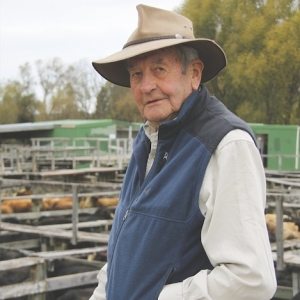The 87-year-old’s name is synonymous with the saleyard circuit in Hawkes Bay and Gisborne. This month marks 60 years since he led his first auction at the Matawhero saleyards hear Gisborne.
It is a rare achievement for the self-professed “showman” who found himself on the auctioneers’ platform at the tender age of 21.
“I was working as a clerk for Dalgetys and was at a Masterton sale with my boss who had just sold a pen,” he told Rural News. “They went to the next one and my boss had gone off to light his pipe. I yelled ‘we’re on’ and he just looked over his shoulder at me and said, ‘no, you’re on’.”
The thrill of his first sale and the stream of compliments that followed sparked a fire in his belly. “I loved it and I started doing three auctions a week as one of the youngest auctioneers in the country. I’m still pretty proud of that.”
Not long afterwards he met his future wife Judith Menzies and successfully applied for the hotly contested head auctioneer position with Hawkes Bay Williams and Kettle. But two weeks before he was due to start the general manager rang to offer him a different location.
“They knew Judith was from Gisborne and asked if I wanted to go there, but behind it all was that some of the board thought I was too young for their Hawkes Bay clients.”
Keen to prove them wrong he held his head high and embraced the new location. On May 30, 1954 Barrie took his first auction at Matawhero and was to spend 30 years in the role – until he was given a taste of farming.
“I had been given a share in 2700 acres of steep country by a grateful client and it was then that I decided to lease 1000 acres of Maori land north of Gisborne,” Gordon explains.
“But it was tough combining farming with auctioneering. Plus the Government took away supplementary minimum payments (SMP) and stock prices were crashing amid a global financial downturn. I ended up paying 31% on money I had borrowed. I enjoyed farming, but financially it was a disaster.”
When his lease ran out he was at a loss as to what to do. But soon another door opened.
“Around that time, I discovered I had an ability to write and approached the Gisborne Herald to ask if I could write about how livestock sales were changing.”
The controversial story was to hit the front page and resulted in a job offer from NZ Farmer – a publication he still writes for.
While Gordon’s last stint at the podium was as a guest auctioneer in 2004, he still lives and breathes sales. He writes up to a dozen sales reports for a number of newspapers each week and regularly contributes to rural publications. He has also written three books based on his time as an auctioneer including Matawhero, Elsewhere and Other Things and Shut the Bloody Gate.
Gordon has seen a lot of change since the early days when they could have up to 10,000 steers in the yards one day followed by 3000-5000 heifers the next. Wool was also gold, selling a pound for a pound.
“Land use is changing and while the flats just used to be for livestock we are now seeing more in cropping, orchards, vineyards and dairying. Plus there is the growth of forestry and the conversion of farms; of course livestock numbers will drop as a result.”
But while the quantity has reduced, the quality continues to grow.
“Modern genetics has enabled farmers to breed the type of cattle and sheep that can develop to a range of new heights.”
Gordon is convinced there is a place for saleyards well into the future despite yard numbers dropping nationwide for 50 years.
“As no two people see animals from the same point of view, the auction system allows freedom of choice as to what farmers pay for them.”
He also sees his time in the sector lasting a bit longer.
“I love people and animals and even now, not being an auctioneer, it is still about the mental challenge. I love nothing more than comparing my judgment before the sale with the end result and seeing if I’ve still got it.”

















